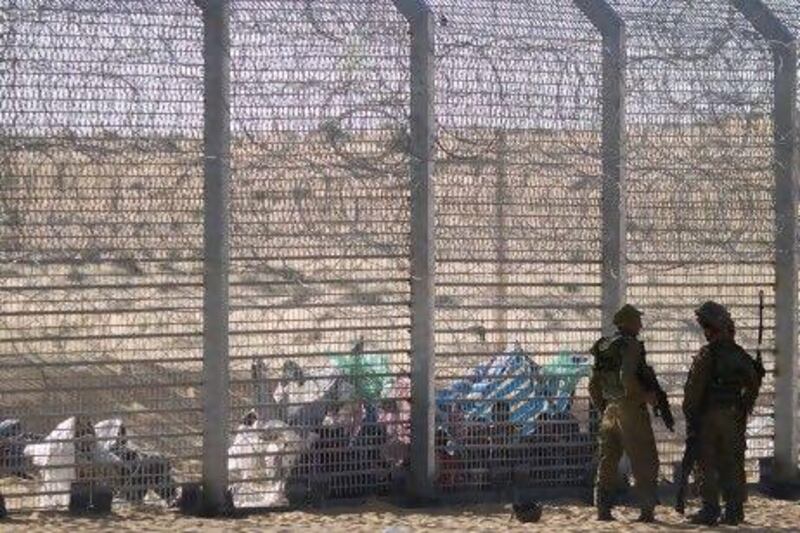TEL AVIV // Israel yesterday rejected activists' demands to let 20 Eritrean asylum-seekers - including a pregnant woman and a 14-year-old boy - to enter the country, despite them being trapped for six days in the desert heat with no food or shade and very little water.
The incident has attracted international attention, amid reports by Israeli rights groups that the woman had suffered a miscarriage since the group tried crossing from Egypt last Thursday and became stuck between two fences in Israeli territory.
Israeli troops posted on the Israeli side of the fence to prevent the migrants from getting into Israel have been instructed to give them "as little water as possible," according to a report by the liberal Haaretz newspaper, quoting one of the soldiers stationed at the border.
Activists said yesterday that the incident was the worst involving African migrants in recent months, since Israel has stepped up its work to erect a system of fences along its porous border with Egypt in a bid to stem the flow of Africans coming into the country.
Eli Yishai, the right-wing, ultra-Orthodox interior minister who has spearheaded efforts to prevent Africans from entering the country, yesterday told an Israeli radio station: "We cannot let them come in.
"Every day there are people stuck there. If there were no fence, and if we hadn't been steadfast, there would be a million people here."
Human rights organisations yesterday slammed Israel for violating international agreements on refugees.
Sigal Rozen, the public policy coordinator for the Hotline for Migrant Workers advocacy group, said international law obligated Israel to assure that asylum- seekers' lives would not be in danger should they be returned to Egypt.
She added that Egypt is known to frequently return to their country of origin Africans who try to escape to Israel through the Sinai desert.
Ms Rozen said: "Yishai is deliberately targeting Eritreans because they make up the bulk of the African refugees in Israel.
"Even if the group was not yet on Israeli territory but was trying to enter, Israel would still be obligated under international law to examine its asylum request."
An Israeli army spokesman said that "forces have been providing the foreigners with water" but did not refer to reports about orders to limit the supply.
About 60,000 migrants from African countries - mostly Eritrea and Sudan - have made perilous treks through Egypt's Sinai desert to the Israeli border in recent years.
While the Israeli government says most of the migrants are seeking better livelihoods rather than asylum, they have also stated that the rising numbers of Africans threatens to undermine Israel's Jewish character.
Israel has almost completed constructing its fence along the 150-kilometre border, and has also deported hundreds of South Sudanese since June.
Last week, Mr Yishai ordered the mass roundup and deportation of all migrants from Sudan, stating in a TV interview that "we will make the lives of the infiltrators bitter until they leave".
Activists said the lives of those returned to Sudan may be at risk because Sudanese officials were likely to punish anyone who had ventured into Israel, which is viewed as an enemy country.
Most of the Africans in Israel reside in rundown neighbourhoods in Tel Aviv, Israel's cultural and business capital, and their growing presence has become a source of tension with the locals, amid right-wing politicians' calls for the migrants' expulsion.
Activists said there were increasing attacks against the Africans on streets as well as the smashing of windows and merchandise in African-owned businesses.
Israel has drawn increasing condemnation for its actions against the migrants. Amnesty International and several Israeli groups said last month that Israeli soldiers had been instructed to venture into Egyptian territory to chase would-be infiltrators and hand them over to Egyptian forces.
Israel said its crackdown on migrants was already paying off by discouraging Africans from coming in the first place.
According to official Israeli data released this week, only 200 Africans entered through the Egyptian border last month, compared with about 2,000 in August last year.
Ms Rozen said that the numbers had fallen not because fewer Africans were trekking towards the Israeli border but because many more of those reaching the frontier were being returned.
The border incident comes as Human Rights Watch yesterday said that hundreds of African migrants travelling through the desert towards Israel were being held by human traffickers and undergoing torture and sexual assault, including rape, to extort ransom payments from their families.





